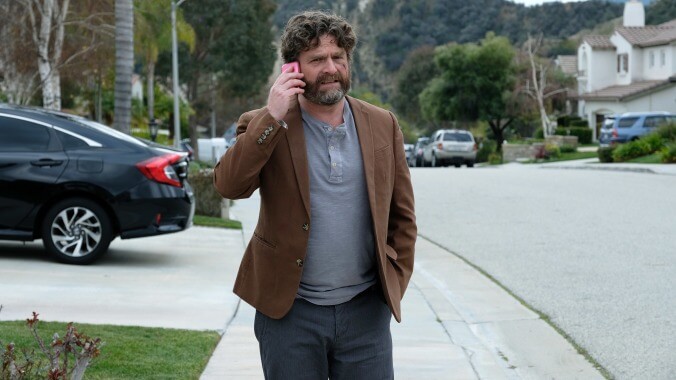Zach Galifianakis as Chip Baskets Image: Erica Parise
Baskets has remained tonally consistent over the past three seasons. The extended Baskets clan—Chip (co-creator and star Zach Galifianakis), Dale (also Galifianakis), Christine (Louie Anderson), her husband Ken (Alex Morris), and Martha (Martha Kelly)—have more or less remained in a state of existential upheaval. Personal and professional failure, medical diagnoses, run-ins with the law, and near-constant familial strife have all befallen the Baskets. Yet they soldier on together, because, as the cliché goes, all they have are each other. Baskets may indulge in its share of cruel, cringe-inducing comedy, but the series has always emphasized that its characters are mostly decent people searching for their purpose in the world. After all, it began as a show about a sad clown trying to bring his skills to a town that couldn’t care less about the legacy of Pierrot.
In Baskets’ fourth season, however, everyone has reached some semblance of stability. Two months after the events of last season, Christine and Ken, now engaged, have bought a new house. Chip successfully manages the rodeo, even brokering deals in the off-season to make some extra revenue. Dale has taken a sabbatical from work and has become accustomed to trailer park life. Martha has a new life coach who’s teaching her to be more assertive. There’s a sense that the big misfit family has finally found a sliver of happiness.
Of course, it’s not that simple for any of them, especially Chip. Baskets largely refocused its third season toward Christine, following her struggle to balance a demanding new job and her myriad relationships, but Chip takes center stage once again this year. Stuck in neutral after all but abandoning his dreams of being a clown, Chip finally musters up the courage to take more responsibility for his life. He moves out of his mother’s house after a resurfaced Penelope (Sabina Sciubba) convinces him that he remains under her thumb. Though he asks her to pay for a condo he likes—albeit as an investment in a property just a stone’s throw away from California’s ultimate pipe dream: the bullet train—Chip actively tries to separate himself from his family with the help of Martha’s life coach, who easily breaks down his diffidence and skepticism. “What were you expecting exactly?” she asks him. “To change everything that’s wrong with your life in one day. This is a daily practice, Chip. That’s the whole point. There’s no magic answer.”
Meanwhile, Christine and Dale struggle with change in their own different ways. Christine has trouble adjusting to the new house even with the presence of Ken, i.e. the nicest guy on TV, so much so that she overstays her welcome while visiting her old house, now owned by another family, because she loves spending time in the kitchen. Dale, on the other hand, has come to represent Galifianakis’ and showrunner Jonathan Krisel’s idea of the Trump supporter: forever angry about the failures in his own life and taking it out on his family and the vulnerable in equal measure. While still halfway sympathetic, Dale has slowly evolved into a cautionary tale for the rest of the Baskets. Make sure to keep moving forward, otherwise you’ll regress into your worst selves.
Comedically, Baskets has basically remained the same, minus some of its more abrasive shades exhibited early on. It’s still mostly a tender mixture of throwaway deadpan jokes, rooted in offbeat character tics, and broad slapstick humor, frequently involving pratfalls or costumes. Galifianakis and Krisel have a knack for localizing airtight sources of comedy in the strangest places, like a sight gag of rollerblading through a 24-hour pharmacy, or a feud between two cats named Susan and Ronald Reagan, or just the most delectably weird product placement. (The creative ways in which Baskets name-check Costco and Arby’s are flat-out inspired.) Dale’s obnoxious fancy boy-cum-boor shtick can still grate, but it thankfully operates in a much less manic register during the first part of the new season. As an offsetting measure, Martha’s new attitude allows her to curse, and there’s nothing like hearing Kelly, in her low monotone voice, call some guy who used to play drums with Peter Cetera a pussy.
Baskets has always been comfortable playing itself as an unfussy drama, often privileging melancholic portraiture over punchlines. However, this season trades in depression for self-improvement, and the results are more poignant than ever before. Galifianakis and Krisel always treated Chip’s ambitions sensitively, even when they didn’t take Chip too seriously, but now that he’s lowered his ceiling from “professional clown” to “respectable human being,” Baskets actively roots for his success. Krisel films a self-help hippie dance circle celebrating Chip’s minor personal progress like it’s a religious event. It’s moving to see Chip rollerblading in a new suit, essentially tuning over a new leaf while still holding onto a scrap of the old one. He even successfully babysits his friends’ newborn baby. (It’s a long way from Super Ray desperately whiskey feeding Baby Spencer to get him to stop crying.) It’s sweet to see Baskets embrace positive change, even if it’s fleeting. Maybe the saddest clown on TV can finally put on a happy face.

 Keep scrolling for more great stories.
Keep scrolling for more great stories.
